I don’t like to think about Pierre as a senior cat, but he is. He’s 11 now, and when he was at the vet this past week, the vet confirmed what I had suspected: he is slowly losing weight on the same diet where that had previously sustained him.
Why could this be? It’s good, high quality food, and that hasn’t changed. The thing that is changing is Pierre’s aging body.
Starting around age 10 or 12, a healthy cat’s aging body becomes less able to digest the protein in the food he eats. Pierre is eating the same food in the same amount he did, but he’s not getting as much of the protein he needs out of it.
Cats Need Protein for Energy
Animals eat food so they can convert it to energy to fuel their bodies. As obligate carnivores, cats need more protein in their diet compared to omnivores like humans. Cats don’t need carbohydrates, and their systems aren’t adapted to process carbs. They convert the digestible protein in their diet into energy to fuel their daily activities.
Not all protein is created equal. Although plant matter may contain protein, as carnivores, a cat’s system is designed to convert animal protein into energy. Even the wrong kind of animal protein isn’t digestible. For example, feathers are made of protein, but they aren’t digestible.
An interesting study about middle-aged cats given a selection of foods and allowed to choose their own proportion of protein, fat, and carbohydrates to make up their daily energy requirements, the cats chose a diet 52% (26 grams) protein. The average body weight of cats in the study was 4.9 kg (10.8 lb for us Americans), which means the cats in this research colony chose to eat 5.3 grams of protein per kilogram of body weight a day.
Another study compared cats eating diets that were either low or high in proteins. Cats fed a 30% protein diet lost about 1.2% of their lean body mass while cats fed a 53% protein diet gained 4.2 lean body mass. The researches in this study concluded that cats needed to eat 5.28 grams of protein per kilogram of body weight a day. Those cats allowed to select the amount of protein they ate in their diet in the other study apparently had already figured that out!
Energy Requirements during Middle Age
We know from the epidemic of feline obesity that middle-aged cats can easily gain weight. This happens partly because their metabolism slows during middle age, a phenomenon that many humans can relate to. Both cats and humans can get “middle age spread” when their metabolism isn’t what it used to be when they were kittens.
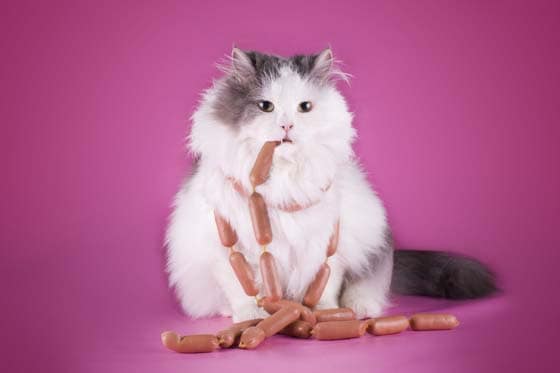
When a cat reaches middle age, their metabolism slows, and they can’t burn off the calories like they used to. Image courtesy depositphotos/kuban_girl
There is a lot of attention currently being focused on the feline obesity epidemic, and it’s easy to breathe a sigh of relief when your older kitty starts to finally lose some of that weight that the vet has been telling you needs come off of him. But that could actually be a sign that your cat is leaving middle age and becoming a senior.
Energy Requirements beyond Middle Age
When cats get to 10 or 12 years old, their bodies start to change. Even healthy senior cats need more calories to convert into the energy their bodies need because they no longer absorb and metabolize the proteins they eat as efficiently as they used to.
A 12 year old cat only digests about 75% of the protein he eats, so he needs even more protein in his diet to make up for it, unless you can convince him to eat 25% more. This inability to digest the protein in the cat’s diet actually increases as he gets even more geriatric. At some point, you can’t keep feeding your kitty more and more of the same food to make up for his inability to absorb nutrients like he used to. Instead, your cat needs a higher amount of digestible protein in the food he eats.
When your cat doesn’t get enough protein to support his energy needs, he uses his body’s energy reserves. When the fat is gone, he begins to use the energy reserves in his own muscles. This is often referred to as called muscle wasting or sarcopenia. Muscle wasting is seen in a lot of elderly cats as well as elderly humans.
To prevent sarcopenia from aging, a cat needs additional calories and protein. After age 12, this need increases 10-60%, or at least 6.0 – 8.5 grams per kilogram of body weight a day.
How Much Protein is In My Cat’s Food?
Armed with this information, I went to look at Pierre’s cat food. He eats a quality food that has served him well for a long time, and since he’s a picky eater, I’m grateful that he likes the stuff.
It was time to bust out some math and figure out how many grams of protein Pierre is getting per kilogram every day to see if that might be an issue. You can follow along with your own cat food, if you want.
The Math
Pierre eats from a 6 oz can of food. 6 oz is the same as 170.097 grams.
To calculate things on a dry matter basis, I looked at the back of the can. 85% of the weight of his food is moisture. That means only 15% of the contents is dry matter.
If I multiply the 170.097 grams of food weight by the 15% dry matter percentage, I discover that the can contains 25.51 grams of food on a dry matter basis.
Next I went to the cat food manufacturer’s web site and looked up the percent of protein in the food by dry matter basis. Be sure you’re getting the dry matter basis number for this step! You are more likely to find an “as fed” percentage, and that isn’t the value you’re looking for. Pierre’s food is 57.1% protein on a dry matter basis. That sounded pretty promising.
I multiplied the number I calculated for grams of food in the can on a dry matter basis (25.51) by this protein percentage (57.1%) to find that there are 14.56 grams of protein in each can.
Now that I’ve calculated how much protein there is in a can, I need to figure out how much Pierre is eating per kilogram of his body weight. He eats one can a day, so we can use the protein value we already calculated for one can of his food. And at the vet last week, he weighed 10.1 lb, which converts to 4.56 kilograms.
If I divide his 14.56 grams of daily protein intake by his 4.56 kg weight, I find that he is eating 3.19 grams per kilogram per day of protein an average middle aged cat needs. It’s even further below the 6+ grams seniors who have started to have difficulty absorbing nutrients from protein need.
I just discovered I’m looking for a new cat food for Pierre!
(I originally figured this all out on a spreadsheet that calculated these numbers to a lot more decimal places, but I’m breaking them down here with only a few decimal places. If you check my math and it is off by a rounding error, that’s the reason.)
What About Your Skinny, Old Cat?
As you read above, Pierre is under a veterinarian’s care, and his vet and I will be discussing this information soon. There are other medical reasons that your cat could be losing weight in his senior years, such as hyperthyroidism, diabetes, or kidney disease, so it’s important that your vet make sure your kitty is healthy before making any changes to your cat’s diet, including increasing the protein in his food.
References and further reading
Journal of Experimental Biology, Geometric analysis of macronutrient selection in the adult domestic cat, Felis catus
Nestle Companion Animal Summit Proceedings, Focus on Gerontology 2010, Dietary Protein Consumption in the Healthy Aging Companion Animal
Journal of Nutrition, High Protein Intake Affects Lean Body Mass but Not Energy Expenditure in Nonobese Neutered Cats
Insights into Veterinary Endcrinology, Optimal Protein Requirements for Older Cats and Cats with Hyperthyroidism

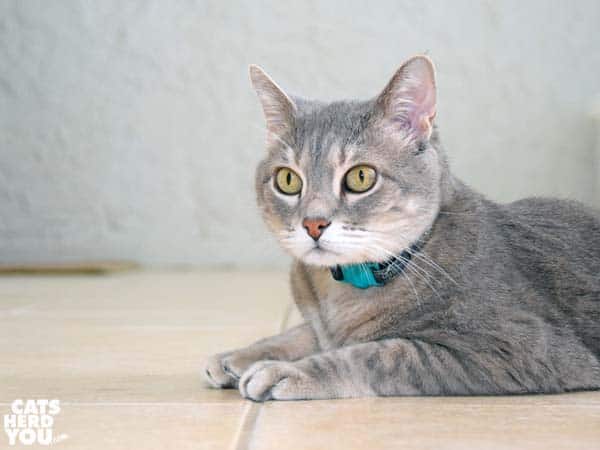
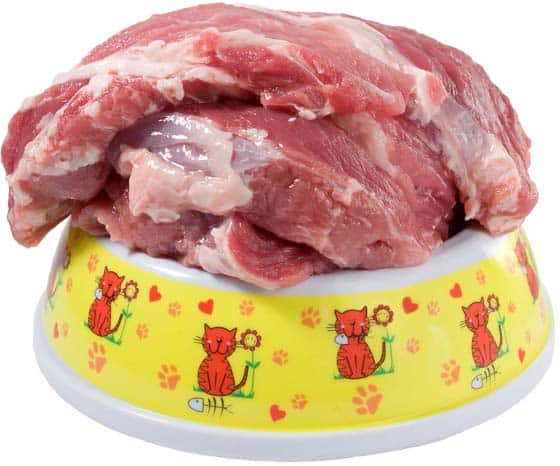
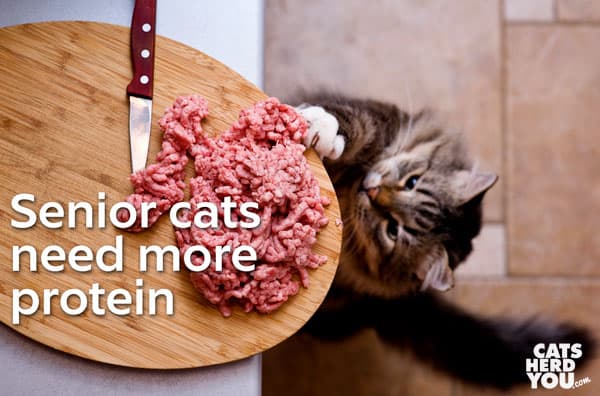
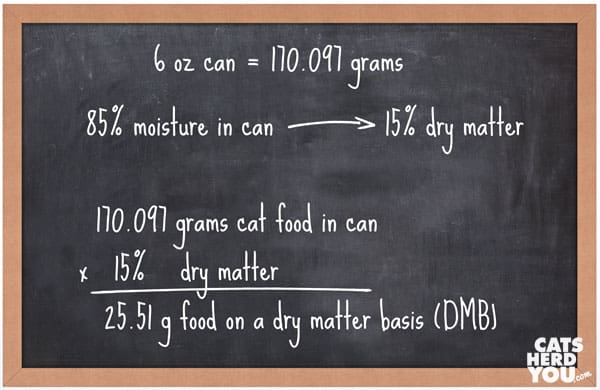
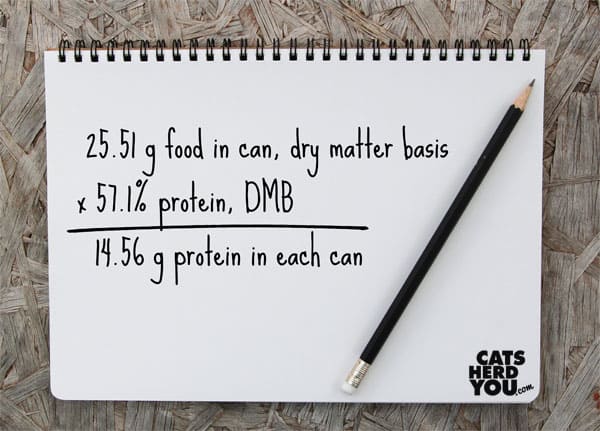
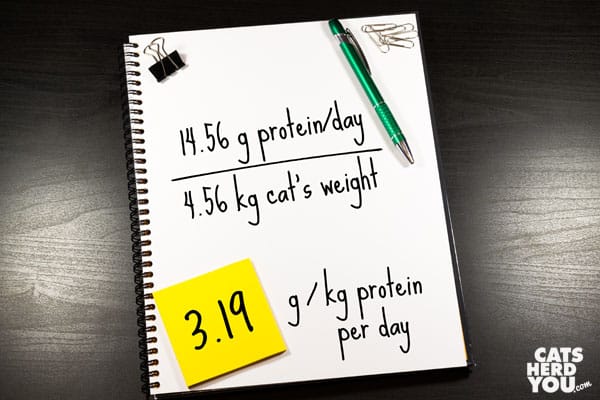






Excellent and timely post. Merlin has gone all raw and at 21 he calls the shots.
Wow, what great info! My human hasn’t done the math, but she knows that Binga (and sometimes Boodie) need more protein because Binga is 15-1/2 and Boodie will be 15 in a couple of months. So Binga gets “lunch” (a portion of moist, high protein cat food) most days, and Boodie gets the same thing some days. And it works – Binga still has the crazy zoomies on occasion and leaps onto counters and goes nuts… and only a healthy, well-muscled cat can do all that!
I’m just bummed because I never get lunch like that… ’cause I’m only two!
Good info. Mom needs to do the math too since Ellie and Allie will be 14 in April!
The Florida Furkids
Wow, with me and Wally now 10 and 12 years of age respectively, the mom needs to check out our food and see if we need more protein. ~Ernie
Feeding kitties sure can get complicated, can’t it! Great information here.
Great post ! And very accurate for Respect Your Cat Day 😉 : a cat is a carnivore ! Purrs
Very good information here! My cats aren’t senior yet, but definitely good to know! Thank you!
Who says you would never use math after you graduate school 😉
Great post, quite thorough on its analysis and I look forward to finding out what you choose for a food.
Pierre buddy I agree!! We need more protein as we age (I just turned 14).
Mom has finally find a most delish canned food I adore. It is for 11+ age by Purina Pro Plan. I love the minced recipe salmon and tuna and beef and chicken….they both send me into orbit. MOL Even my dad says they smell good
Hugs madi your bfff
interesting…..it certainly is an issue around here – Tommy is considered a senior, Mozart is about as skinny as they come and Ivy and Daiquiri could stand to lose a little.
This is an awesome article, and it’s definitely something I’m starting to think about as Carmine just turned 11 years old, and Milita is turning 13 this summer! I’ll be sharing this everywhere – I’m sure it will help many cat owners!
Very informative. I am going to bookmark this and refer to it. Emma is 8 now and she’s on her way there where I don’t want to think about.
Great article – they don’t make it easy to figure this stuff out – just reading the labels on the cans. Having gone through kidney disease with Tommie, and the muscle wasting from the low protein diet prescribed for CRF, I want to make sure my 6 and 3 year old cats are getting good nutrition. They get very little dry food because I’m concerned about keeping them well hydrated.
Thank you.
Lots of great info here! My angel Rosie lived to 21, and in her older years I certainly started to notice her losing weight and muscle mass if not on a proper diet. However, what made her diet even more difficult to fine-tune was her kidney disease, which can worsen if the cat is fed a diet high in protein. That was always quite a balancing act, making sure she got all the proper nutrients to maintain her weight while also working around her kidney disease.
Thank you for sharing this great post full of very important information! Purrs!
That’s a lot of math! But now that Lexy is a “mature” cat, Mommy better get the calculator out. Thanks for this great info.
guys…thanx two yur mom for thiz post….ther bee two seniorz livin in de land oh trout rite now…..boomer ternz 18 and daiz…13…. ♥♥♥
{ and we iz crackin up at de fotoz oh de meat in de dish N de kitteh with de hot dawgs….price lezz }
🙂
Excellent post. Spooky is very thin because of his kidney disease, but Phoebe’s blood work was good and she is getting thin.
Excellent post! We’re looking forward to seeing which food you find for Merlin!
Thank you so very much for this excellent gathering of information and posting it for us. What a einderful needed service you have provided us. ❤️😻
“Wonderful” not that silly typo above.
Correct me if I’m wrong but I thought you fed raw food you made or am I thinking of another blog? I’m around the same age as Pierre and last year I’d lost a bit of weight that worried the vet. My blood work was fine. Maybe I need more protein. We’ll see what she says next month. Great info but you lost TW with the first equation.
Good memory, CK! Both Ashton and Newton eat raw. Pierre remains convinced that the two of them are off their rockers and holds out for the stuff that comes in cans.
Great info!
I’ve gotten to the stage where I’m extra-picky. This makes my mom sad.
That really was terrific but I got lost when the cyphering started!
Wow! This was SO fascinating! Thank you so much for breaking this all down for us. I never knew that the older a cat gets, the more protein he/she needs. It makes complete sense though. I’m happier now than ever that I’ve transitioned both Katie & Waffles to a whole food diet. Waffles is all raw and Katie is eating a cooked version of the same. I just can’t get Katie to make the switch. But a cooked whole food is still a great thing for her.
I’m not sure exactly how to figure out the protein on it, but I’m guessing that since it’s nothing but meat, bones and organs that it’s got to be really high.
Have you done any calculations to Ashton and Newton’s raw food?
Thank you again… Well done!!!
PS from Katie: “Senior???”
Funny you should ask about that. I’m working on it, but am getting stuck in researching moisture percentages and trying to figure out how they are impacted by including bone in the grind. I add a surprising amount of water to their raw, so that has to be taken into account, too. I’ll do a post with protein numbers for raw when I think I’ve figured that out.
Very informative. I wish the nutritional information on pet foods was more informative. Few people will go to the trouble of doing the math, even though it’s not very difficult.
Very thorough analysis. But Mom L, like CK’s TW, was lost in the first analysis. So we skipped to the bottom line, which is seniors require even more protein than younger cats. We learned that when Mom L and Dad P were bringing Cuzin Leo back from the brink of death due to hepatic lipidosis. The food content was instrumental in determining his great need for high calorie intake PLUS ample protein, and no, Evanger’s food was not used
So I don’t get a panic attack over doing the sums, is a good high protein food for the seniors a good extra?
Oh NOES! Mommy’s giddy over the maths. Seriouslies, you just made her day (she is SUCH a geek).
And she LOVES this. It’s a very important message!!
I look forward to study follow ups on the cats allpwed to choose their own percentages. After three years, what percentage of the cats that chose higher protein have kidney disease, and can this be compared to the national average?
This is the work that can hallmark real change — long-term effects.